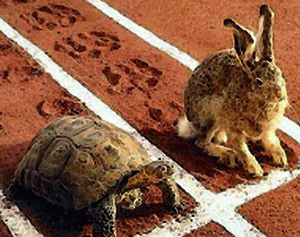Azizi Ansari's runaway bestseller Modern Romance is the perfect self-help book. Lots of data, thoughtful interviews with psychologists and 'victims'; and funny. The celebrated stand-up comic confirms the truth in the oxymoron, "the wise fool". And surprisingly, finds that humans pretty well figured things romantic out long before computers.
A few nuggets:
Experiments on rats show the "uncertainty principle" in rewards: reward the rat when it presses the knob till s/he figures out it must press the lever to get the treat, but after that, only reward it intermittently. Their reward dopamine levels increase beyond the level when they always get rewarded for knob-pushing, like they're "being coked up". We are rats: in the human version of the experiment, women are most attracted to those guys who are in the 'uncertain' group; those who rated them high are second rate. No doubt this works the same for men.
There's less enjoyment with too much choice. You become anxious, obsessed with detail. Maximizing is just too difficult in relations, too unromantic. Ansari's interviewees who spend hours sorting through dozens of hopefuls end up frustrated and petty ("Reject. She likes the Redsocks."). He went through this himself, and ended up, after eight years of 'internetting', bumping into a women he'd dated years previous (not from the internet), and they are a happy couple now.
It's better to be a "satisficer" (satisfy + suffice). Ansari goes to a retirees' home (with a big bag of Dunkin' Donuts) and the residents gather around and most reflect on their love lives (some just to cadge a treat). Victoria remembers her great romance in her salad days in the 1950s: "I was standing in front of my building with some friends and he approached me, told me he liked me very much and asked if I'd like to go out with him. I didn't say anything. He asked me two or three more times before I agreed." They went to a movie and had dinner at her mom's house. After a year, they married. That was 48 years ago.
The same goes for work. The gung-ho applicant who carefully weighs up a dozen possibilities and goes for the 'dream job' (vs the more laid-back guy who takes the first offer that's okay) ends up disappointed most of the time. Maximizers have less job satisfaction, are less certain they selected the right job, even though they get more pay.
The return of marriage:
Analysis of marriage trends since the 1940s is fascinating. In 1940, a quarter of couples met through their families, 20% through friends, 12 % as neighbors or at church. By 1990, the weakening of family ties and religion, the increase in women working, and widespread university studies, meant that now 40% met through friends, 20% as co-workers or at bars, and only 15% through their families. Ten percent met at university. Satisficers all.
By 2010, 30% met through friends, 22% at bars or online, and only 10% through work, college, and family. Gone are the days of satisficers, making do with the 'boy next door' as your true love.
And are we happier with this revolution? Ansari concludes: "binding with someone is more complicated and stressful than for the previous generation, but you are more likely to find someone you are excited about." Yes, romantic love is possible after all. We can maximize happiness. There are dozens of Tinder clicks possible each day (Tinder requires a mutual click before you can actually text and meet), so you can find that face that really, really turns you on.
But there's a catch. Passionate love peaks early and collapses in the third month. Sometimes it survives, but always at a lower level of intensity than companionate love (remember Victoria), which continues to grow throughout your life. Brain scans show the anxiety region of brain is not active when the Victorias think about their Freds; rather the brain's calmness region lights up. After 60 years, the companionate turtle wins the race, leaving the passionate hare far behind.
The greatest joys in life are from nurturing and 'generativity', striving to build something, having children, leaving something behind. Which leaves the brave new world of singles behind. Considering 50% of households are now one resident (no pets, please), this explains a lot about the sad state of our lives.
Irony of ironies, marriage has become a status symbol--"a highly regarded marker of a successful personal life", according to Andrew Cherlin, author of Marriage, Divorce, Remarrying, which perhaps explains the obsession among gaylibbers to marry. There is little 'generativity' in gay relations, so marriage is a way to achieve some kind of social and self-affirmation. Ditto, the urge to adopt, or better yet, find a surrogate mother/ sperm donor, and try to raise a real, live family.
Global village:
(Note: You can view every article as one long page if you sign up as an Advocate Member, or higher).






